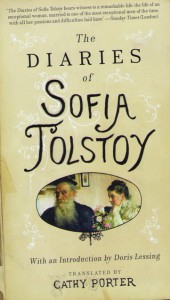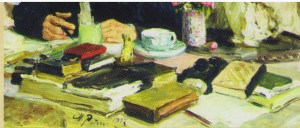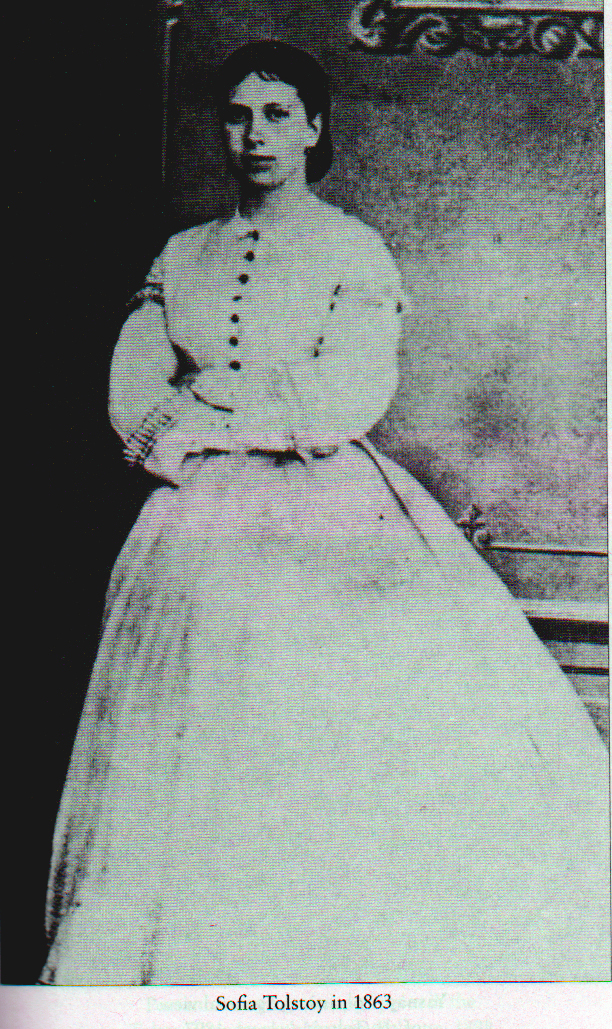“His Majesty Begs Her Excellency the Countess Tolstoy to Enter”, said the Footman ( from “The Diaries of Sofia Tolstoy”, translated by Cathy Porter, Harper Perennial, 1985, 2009)
 “I followed him to the Tsar’s study and he bowed and left. The Tsar Alexander III came to the door to meet me and shook my hand, and I curtseyed slightly…”
“I followed him to the Tsar’s study and he bowed and left. The Tsar Alexander III came to the door to meet me and shook my hand, and I curtseyed slightly…”
The front cover of the book is to the left and to the right is the back cover of the diaries of a remarkable woman Sofia Tolstoy that reveal a woman of tremendous vital energy and poetic sensibility who, in the face of provocations and suffering, continued to strive for the higher things in life and to remain indomitable.
But let us return to the excerpt from the book:
“Do forgive me, Countess, for keeping you waiting for so long,he said. “It was impossible for me to receive you earlier.’
I replied:”I am deeply grateful to Your Majesty for doing me the honour of receiving me.”
Then the Tsar began to talk about my husband. I don’t remember his exact words, and asked me the nature of my request. I spoke in a quiet, but firm voice.
“Your Majesty, I have recently observed that my husband seems disposed to resume his literary endeavors. Only the other day he was saying to me: “I have moved so far beyond these philosophical and religious works now that I think I might start on some literary work-I have in mind something similar to War and Peace, in form and content.” Yet with every day that passes the prejudice against him grows stronger. Volume 13 was banned, for instance, although it has now been decided to pass it. His play THe Fruits of Enlightenment was banned, then the order was given for it to be performed on the Imperial stage. The Kreutzer Sonata was banned…”
might start on some literary work-I have in mind something similar to War and Peace, in form and content.” Yet with every day that passes the prejudice against him grows stronger. Volume 13 was banned, for instance, although it has now been decided to pass it. His play THe Fruits of Enlightenment was banned, then the order was given for it to be performed on the Imperial stage. The Kreutzer Sonata was banned…”
“Surely though you wouldn’t give a book like that to your children to read?” the Tsar said.
I said: “The story has unfortunately taken a rather extreme form, but the fundamental idea is that the ideal is always unattainable if the ideal is total chastity.” Listen to:David Oistrakh, Beethoven, Sonata #9 “Kreutzer”
I also recall that when I told the Tsar that Lev Nikolaevich seemed disposed to write literary work again, he said:”Ah, how good that would be! What a great writer he is!”
The ban was lifted up. Lyovochka was displeased about my adventure and my meeting with the Tsar. He said we had now taken on all sorts of responsibilities we could not possibly fulfill. He and the Tsar had managed to ignore each other up to now, he said; all this could do us a lot of damage, and might well have disagreeable consequences.”
Yet nobody knows my real motive for visiting St. Petersburg. It was all because of the Kreutzer Sonata. The story cast a shadow over my life. Some people suspected it was based on me, others felt sorry for me. Even the Tsar said: “I feel sorry for his poor wife”. So I wanted to show that I wasn’t a victim at all; I wanted to say my visit to St. Petersburg was something I had done instinctively. I knew in advance that I would be successful and prevail upon the Emperor, for I haven’t lost my powers of winning people’s sympathy; and I certainly made impression on him, with my words and my demeanor. The Tsar told to Countess Sheremeteva that he found our discussion was so interesting and enjoyable, and he didn’t realized I was still so young and pretty. All this flatters my female vanity, and avenges me for all the years in which my husband not only failed to promote me in society, but actually did his utmost to drag me down. I can never understand why.”
Mother of 9 children she educated them at home giving them lessons in French, German, Russian, literature, religion, had sewn clothes for them, darned socks, looked after them and her husband, being a hostess of the house and a financial trustee.
Look at the picture show “Sofia Tolstoy’s family”:
As for her personal life, she lived to the fullest, enjoyed love and being loved. She as well as her husband were the children of their time, as all we are, and can do only so much.
Listen to:Sergey Taneev, Cantata “St. John of Damascus” (Part 1)
